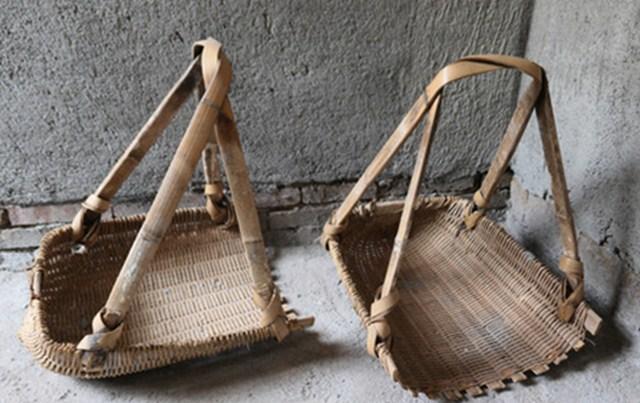There are two words in Zhanjiang and western Guangdong, involving two kinds of bamboo containers in the countryside - "dung jizai" and "dustpan cooking", the locals know what is going on, and the outsiders, especially the northerners (north of Guangdong), listen to the vast majority of the confused faces.
Dung basket, an indispensable household farm tool in the countryside before the 70s of the last century, shaped like a dustpan and like a basket, deeper than the dustpan, a little shallower than the basket, a lifting beam in the middle, generally woven with bamboo or wicker, used to pick up dog manure, cow dung, pig manure and other livestock manure, used as fertilizer. Later, there was no shortage of fertilizer for rural land use, and the manure slowly disappeared from people's vision, but it can still be seen in many rural areas.

Rural dung
The dung basket, literally, seems to refer to a small dung basket, but it is not, it refers to the child in the dung basket. The word is usually used to scold children for not arguing and stirring up, but although it is widely used now, the original meaning is quite vicious.
In the past, people had a difficult life, underdeveloped science, poor medical care, and often tragic deaths of children. Adults packed the bodies of dead children in dung and buried them on the slopes of the ridge, and such children generally could not be buried in ancestral graves. Therefore, the original meaning of cursing people "dung jizai" was to curse people to death, and there was no place to die (in ancient times, it was a very serious thing, and it was often used when swearing). There are similar insults in other parts of Guangdong, such as Guangzhou called "dung ji digging", And Mao's name is "dung ji (rice)", which is the same meaning.
Although the original meaning of "Dung Ji Boy" is vicious, it is often used by parents when cursing children, are they not taboo? This is the folk custom. In the past, people did not dare to say good things about children, for fear of being hated by ghosts and attracting bad luck, but the more fierce and vicious the scolding, the better the luck of children.
Naughty kids
The "dustpan cooking" is a well-known snack in western Guangdong. "Dustpan" is a kind of bamboo woven flat description, "cooking" is the meaning of cooking by fire, northerners can not understand the meaning literally, but the three words of "dustpan cooking" are connected, in our case is the name of a kind of pastry.
Dustpan cooking is very popular in maoming's districts of Dianbai, Gaozhou, Xinyi, Huazhou, Zhanjiang, Suixi County, Lianjiang City, Wuchuan City, Leizhou City, and Xuwen County. Famous for its dustpan made of bamboo baskets, Huazhou is also known as "Geji" or "Dustpan".
Gangmen Town, Beipo Town, Caotan Town, Yang Citrus Town, etc. along the west coast of Suixi are called "white baskets" (different from the kind of stuffed white rice dumplings), and Zhanjiang City and Lianjiang City call them dustpan cooks, and are most famous for Lianjiang dustpan cooking. This word was originally a meter word and a B word, which could not be typed, and was temporarily replaced by this word.
Dustpan cooking method: grind the rice flour into a pulp in the dustpan, steam it in a pot, and then gradually add it after one layer is cooked, generally there are more than three layers. When the rice noodles are fully cooked, cut it into a grid shape with a knife and add sesame oil, sesame seeds and garlic chicken fat to the surface.
In summer and autumn, the dustpan is cut into small squares, sprinkled with small sesame seeds or served with garlic, soy sauce and peanut oil, and in winter and spring, the dustpan is cut into small squares and stir-fried with chili sauce. Some people also mix spinach juice into the rice milk to make a green dustpan cook. Dustpan cooking entrance is delicate and elastic, soft and smooth without sticky teeth, fragrant and not greasy, that taste is unforgettable after eating, dustpan cooking these three words will definitely be remembered in mind.
In the 1980s and 1990s, dustpan cooking was one of the most extravagant snacks for rural children. Buying a dustpan cooker is not like buying other snacks to trade in cash, no money can also eat dustpan cooking, take the rice in their own rice tank to find a vendor to change, a pound of rice can be exchanged for a piece. Parents are not at home, as long as there is rice in the rice tank, there are dustpans to cook. It often happens that children steal rice to exchange for dustpan cooking and are beaten up by adults.
The famous snack dustpan cooking in western Guangdong
Therefore, one side of the water and soil to support the other side, the other side of the people have their own unique folk customs. If you are a Cantonese and Westerner, have the words "dung jizai" and "dustpan cooking" appear in your life? Welcome to leave a message to discuss.